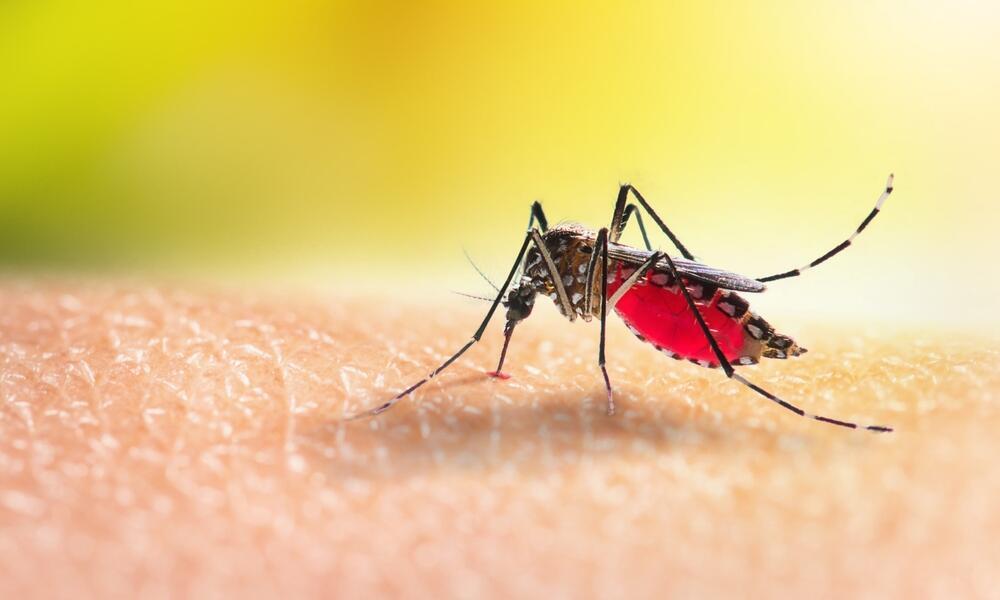Getting your Trinity Audio player ready...
"This is the fourth time I’ve traveled to Thailand, and nothing like this has ever happened to me before," says 61-year-old Daniel Boblil of Netanya, who contracted dengue fever about two months ago while vacationing in the popular Southeast Asian destination. Upon returning to Israel, Boblil was hospitalized at Laniado Hospital with severe nausea and intense headaches.
"As soon as I landed, I started feeling strange," she recalls. "My condition deteriorated—I had severe nausea, fever, and chills. I couldn’t eat or drink, I was constantly vomiting."
As the travel season to Thailand begins—or is already underway for some—the risk of contracting dengue fever increases. The viral disease, transmitted by the bite of the Aedes mosquito (commonly known as the Asian tiger mosquito), continues to spread throughout many parts of the country, including popular tourist destinations such as Bangkok, Koh Samui, and Koh Phangan. Experts warn that the number of infections is rising and urge travelers to take preventive measures and consider getting vaccinated against the virus before flying.
At Sheba Medical Center, dozens of dengue cases are treated each year—most involving patients who contracted the virus in Thailand, a longtime favorite among Israeli tourists. "We tend to see more cases around Passover, the summer, and the High Holidays, when many Israelis travel abroad and are exposed to mosquitoes," says Prof. Eyal Leshem, an infectious disease expert and director of Sheba’s Center for Travel Medicine and Tropical Diseases.
‘I had no idea this could happen’
Boblil says she first went to her family doctor, who did not suspect dengue fever—even after she mentioned returning from Thailand. "He said it was nothing serious and that I should just monitor it. The next day, I couldn’t stop vomiting, and my husband decided to take me to the hospital," she says. Blood tests at the hospital showed a low platelet count, raising doctors’ concerns about potential internal bleeding—a sign of severe dengue.
 Prof. Eyal LeshemPhoto: Sheba Medical Center
Prof. Eyal LeshemPhoto: Sheba Medical Center"I felt helpless and was overwhelmed with fatigue," Boblil recalls. She admits she had never even heard of the disease before becoming ill. "I have no idea when during the trip I was infected. I didn’t use any mosquito repellent."
A few days later, Boblil was discharged from the hospital, and test results confirmed she had indeed contracted dengue.
Roy, 26, also had no knowledge of the disease before getting it himself last year. Just days after landing in Thailand, he began feeling unwell—lethargic and drained of energy. "I knew something was wrong, but thought it would pass," he says. "I had a high fever, vomiting, and diarrhea for four days. I thought it was the flu and would go away. I was using mosquito repellent but had never heard of dengue. I had no clue. A friend messaged me and told me to go to a hospital—that's what saved me."
After arriving at a local hospital, Roy underwent blood tests. "They immediately told me I had dengue and that I had to be admitted. It was awful—extremely difficult—and it got worse as it progressed," he says. "During my hospitalization, I broke out in a full-body rash, had itching, a high fever, loss of appetite, nonstop headaches, and couldn’t sleep. I was given painkillers, but they didn’t help. I was in excruciating pain—pain you can't even imagine."
Heading to Thailand? Prepare in advance
Dr. Talia Fein-Fried, head of the Infectious Diseases Unit and Travel Clinic at Laniado Hospital, says there's been a rise in the number of Israelis infected with dengue while traveling abroad. "There’s no area in Thailand that is dengue-free," she says. "From nature trips to major cities—including Bangkok—and even popular vacation spots like Koh Samui and Koh Phangan, the risk is present everywhere."
According to Dr. Fein-Fried, it’s possible to contract the virus at any time of day and any time of year, though the highest risk is between May and August. "Reports from Thailand indicate that in April alone, over 2,000 new cases of dengue were being recorded every week—signaling a major outbreak across the country."
She emphasizes that dengue isn’t limited to Thailand. The disease is also common in parts of Southeast Asia, South America, and Africa. "Before traveling to tropical or developing countries, it’s crucial to consult a travel clinic to understand how the virus spreads, what protection measures to take, and how to avoid mosquitoes," she says.
As for treatment, Dr. Fein-Fried notes there is no specific cure for dengue. Care involves hydration and supportive treatment. "After the critical one or two days of illness—once the fever subsides—recovery is possible, but there’s also a risk of deterioration. This can manifest as shortness of breath, low blood pressure, internal bleeding, or kidney failure."
Prof. Leshem explains that dengue fever causes hundreds of millions of infections globally each year, primarily in tropical regions such as Thailand, Brazil, and Argentina. "The World Health Organization estimates that around 400 million people contract dengue annually, and roughly 4 billion people live in areas at risk of infection," he says
Infection, prevention, and a new vaccine
Dengue fever is a viral illness spread by the bite of an Aedes mosquito. "Common symptoms include high fever, headaches, muscle pain, nausea, and often a distinct rash," says Prof. Leshem. In rare cases, the disease can become severe, leading to internal bleeding, a drop in blood pressure, and even death.
He notes that serious illness is more likely in people who are infected for a second time. "A primary infection can still be severe, but life-threatening complications are more common in secondary infections." Some people, however, may never develop symptoms or may not realize they were infected at all.
Get the Ynetnews app on your smartphone: Google Play: https://bit.ly/4eJ37pE | Apple App Store: https://bit.ly/3ZL7iNv
Though dengue is mostly associated with tropical regions, Prof. Leshem says the mosquitoes that carry the virus have spread to Europe in recent years, including Italy and France, and to parts of the United States such as Florida and Hawaii. "The disease can break out anywhere the mosquitoes live, but outbreaks in these regions typically involve just a few dozen cases."
One mosquito species capable of transmitting dengue, known locally as the Asian tiger mosquito, is also found in Israel. "It’s a fairly common mosquito here—found in backyards, puddles, and even in poorly drained flowerpots," says Leshem. For the mosquito to transmit dengue, however, it must already be carrying the virus, which typically occurs after biting an infected person. "There is a risk of a local outbreak in Israel, but we consider it low. So far, no local transmission has been documented—only cases among travelers returning from abroad."
Leshem advises travelers to apply insect repellent when outdoors, especially in the morning and at dusk, when mosquitoes are most active.
Recently, a new dengue vaccine called Qdenga became available in Israel. Approved by both the FDA and the Israeli Ministry of Health, the vaccine is offered at travel clinics but is not included in the national health basket. Administered in two doses, it is recommended for people who have previously been infected and aims to reduce the risk of reinfection and severe illness. Still, since many people are unaware they were ever infected, the vaccine can also be given to individuals with no history of dengue.
"The vaccine is given in two doses, three months apart," explains Prof. Leshem. "However, if your trip is coming up soon and there’s not enough time for both doses, even one dose provides protection. It’s better to get one dose than to travel unvaccinated," he adds. Maximum protection develops about two weeks after vaccination, so he recommends getting vaccinated as early as possible.



